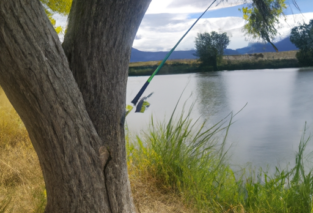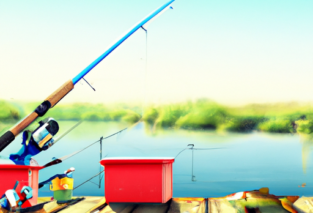Imagine embarking on a journey to become a skilled angler, but feeling overwhelmed by all the new experiences and knowledge you need to absorb. Fear not, as “Keeping A Fishing Diary: Tracking Your Progress As A New Angler” is here to guide you through this exciting endeavor. This unique product allows you to record and reflect on your fishing adventures, helping you track your progress, learn from your successes and failures, and ultimately become a knowledgeable and accomplished angler. With “Keeping A Fishing Diary” by your side, you’ll be able to document your catches, jot down techniques and tips, and celebrate each milestone as you chart your path to fishing mastery.
![]()
The Importance of Keeping a Fishing Diary
Documenting Your Fishing Adventures
As an avid angler, keeping a fishing diary can greatly enhance your fishing experience. It serves as a personal record of your fishing adventures, documenting the moments and memories that make each trip unique. By writing down your experiences, you create a narrative that allows you to relive the excitement and joy of each catch. Whether it’s the thrill of reeling in a big fish or the peacefulness of spending a day on the water, your fishing diary becomes a treasure trove of memories that you can revisit whenever you want.
Tracking Your Progress
One of the key benefits of maintaining a fishing diary is the ability to track your progress over time. By consistently recording details about your fishing trips, you can start to see patterns emerge and gain valuable insights into your angling journey. As a new angler, it’s essential to track your progress and learn from each experience. Your fishing diary becomes a roadmap of your growth and development as an angler, showing you how far you’ve come and motivating you to keep improving.
Identifying Patterns and Trends
Another crucial aspect of keeping a fishing diary is the ability to identify patterns and trends. By recording details such as the date and time, location, weather conditions, water conditions, tackle and bait used, species caught, size and quantity of fish, as well as any notable observations and experiences, you can spot patterns that may influence your success. For example, you may notice that you have the most success fishing in a particular location during a specific time of day or under certain weather conditions. This valuable information allows you to make more informed decisions about when and where to fish, increasing your chances of a successful outing.
Improving Your Fishing Skills
A fishing diary can also be a powerful tool for improving your fishing skills. By analyzing the information you’ve recorded, you can identify areas for improvement and adjust your strategies accordingly. For example, if you consistently struggle to catch a certain species, you can experiment with different bait or techniques to see if they yield better results. Additionally, reviewing your diary can help you learn from your mistakes and avoid repeating them in the future. With each entry in your fishing diary, you become a more knowledgeable and skilled angler.
Setting Up Your Fishing Diary
Choosing the Right Format
When it comes to setting up your fishing diary, there is no one-size-fits-all approach. The format you choose will depend on your personal preferences and what works best for you. Some anglers prefer to keep a physical diary, using a notebook or journal to handwrite their entries. This traditional method allows for a more tactile and personal experience, with the ability to add sketches or other visual elements. Others may prefer to use a digital diary, whether it’s a dedicated fishing app or a simple document on their computer. The advantage of a digital diary is the ease of searching, organizing, and storing your entries.
Including Key Information
To ensure your fishing diary is comprehensive and informative, it’s important to include key information in each entry. This will help you later on when you’re analyzing your diary and reflecting on your fishing experiences. Some essential details to include are:
-
Date and Time: Recording the date and time of each fishing trip allows you to track your progress and identify any time-based patterns.
-
Location: Noting the specific location of your fishing spot can help you identify areas that consistently produce good results.
-
Weather Conditions: Documenting the weather conditions, such as temperature, wind speed, and cloud cover, can help you determine how weather affects fish behavior.
-
Water Conditions: Recording details about the water conditions, such as water temperature, clarity, and current, can provide insights into where fish may be located.
-
Tackle and Bait Used: Keeping track of the tackle, bait, and lures you use allows you to replicate successful setups and avoid ineffective ones.
-
Species Caught: Recording the species of fish you catch helps you understand the different types of fish in your area and their habits.
-
Size and Quantity of Fish: Noting the size and quantity of fish caught allows you to track your progress and identify any trends in fish size or abundance.
-
Notable Observations and Experiences: Finally, don’t forget to jot down any unique or memorable experiences during your fishing trips. These can add depth and color to your diary entries.
Organizing Your Entries
As your fishing diary grows, it’s essential to keep it well-organized for easy reference. Consider creating sections or categories within your diary to help you quickly locate specific entries. For example, you could organize entries by month or by fishing location. If you’re using a digital diary, take advantage of the search feature to quickly find entries containing specific keywords. By establishing a system for organizing your entries, you’ll be able to navigate your diary efficiently and extract the information you need.
![]()
What to Include in Your Fishing Diary
Date and Time
The date and time of your fishing trip are vital pieces of information to include in your diary. By recording this data, you can easily track the progress of your angling journey and look for patterns in your fishing success over time. Additionally, knowing the date and time of each trip helps you plan future outings and optimize your fishing strategies.
Location
Providing the specific location of your fishing spot is crucial for several reasons. First, it allows you to revisit successful fishing spots and replicate your success. Second, it helps you identify patterns in fish behavior based on different locations. By recording the location in your diary, you build a database of local fishing knowledge that can guide your future fishing endeavors.
Weather Conditions
The weather plays a significant role in the behavior of fish. Recording the weather conditions during your fishing trips allows you to understand how different weather patterns impact fish activity. Factors such as temperature, wind speed, cloud cover, and precipitation can all influence fish behavior. By tracking these conditions in your fishing diary, you can uncover patterns and adjust your fishing strategies accordingly.
Water Conditions
The conditions of the water you are fishing in can greatly affect your success. Water temperature, clarity, and current are all important factors to consider. Different species of fish have preferred water conditions, so understanding the water conditions during your fishing trips can help you target the right species in the right locations.
Tackle and Bait Used
Keeping track of the tackle and bait you use during your fishing trips is crucial for replicating successful setups and avoiding ineffective ones. Note the type of fishing rod, reel, line, hooks, and lures you use, as well as the specific bait you employ. This information allows you to fine-tune your tackle selection and make informed decisions on what setups work best for specific conditions and target species.
Species Caught
Recording the species of fish you catch helps you understand the ecosystem of your fishing area and the habits of different fish. By tracking the diversity of species caught, you can gain insights into the health and variety of fish populations in your chosen fishing locations. This information can also guide your future fishing adventures by helping you target specific fish species.
Size and Quantity of Fish
Noting the size and quantity of fish caught during each trip allows you to track your progress as an angler. By recording this information in your fishing diary, you can measure how your skills and techniques are leading to bigger catches or higher quantities. This data is valuable for evaluating your growth and improvement over time.
Notable Observations and Experiences
Remember to capture any unique or memorable observations and experiences while on your fishing trips. These details help bring your entries to life and make your fishing diary more personal. Maybe you encountered a rare bird or witnessed a breathtaking sunset. These seemingly unrelated moments can contribute to the overall enjoyment and enrichment of your fishing diary.
Using Technology to Enhance Your Fishing Diary
Digital Diary Apps
In the digital age, there are numerous fishing diary apps available that can enhance your angling experience. These apps offer features such as automated weather tracking, GPS location tagging, species identification, and the ability to attach photos to your entries. Some apps even provide advanced data analysis to help you identify patterns and trends. By using a digital diary app, you can streamline the process of documenting your fishing adventures and have all your information conveniently stored in one place.
Smart Fishing Gear
Advancements in technology have also led to the creation of smart fishing gear. These innovative tools can integrate with your fishing diary to provide real-time data and insights. For example, smart fishing rods can track vital statistics such as casting distance, retrieve speed, and fish strikes. This data can be automatically recorded in your fishing diary, eliminating the need for manual entries. By incorporating smart fishing gear into your angling routine, you can gather more accurate and detailed information for your diary.
Online Mapping and Weather Tools
Online mapping and weather tools can greatly enhance your fishing diary by providing valuable information before you even set foot on the water. By utilizing tools such as online maps, satellite imagery, and fishing hotspots databases, you can research the best fishing locations and plan your trips more effectively. Additionally, weather forecasting websites and apps can provide detailed information about weather patterns, tides, and lunar phases, all of which can impact fish behavior. By utilizing these online tools, you can augment your fishing diary with data-driven insights and increase your chances of success.
![]()
Analyzing and Reflecting on Your Fishing Diary
Reviewing Patterns and Trends
Analyzing your fishing diary regularly allows you to identify patterns and trends that may not be immediately apparent. By reviewing your entries as a whole, you may notice that you consistently catch more fish during certain seasons or under specific weather conditions. This information helps you make more informed decisions about when and where to fish in the future. Additionally, analyzing patterns and trends allows you to evaluate the effectiveness of different techniques and identify areas for improvement.
Adjusting Strategies
Your fishing diary serves as a valuable resource for adjusting and refining your angling strategies. By reflecting on your past experiences and the information captured in your diary, you can fine-tune your approach to fishing. For example, if you notice that your go-to bait is consistently unsuccessful, you can experiment with different bait options based on the data recorded in your diary. Continuously adjusting your strategies based on the insights gained from your fishing diary can lead to improved fishing success.
Identifying Areas for Improvement
Keeping a fishing diary enables you to identify areas where you may need improvement or further education. For example, if you consistently struggle to catch a specific species or have difficulties with a particular technique, your diary can serve as a reference for further investigation. You can consult educational resources, join fishing forums, or seek guidance from experienced anglers to gain insights and develop strategies to address these areas for improvement.
Celebrating Milestones
Another rewarding aspect of maintaining a fishing diary is the ability to celebrate milestones and achievements. Whether it’s catching a personal best, achieving a specific fishing goal, or simply observing growth and progress as an angler, your diary becomes a record of your accomplishments. By reflecting on these milestones, you can feel a sense of pride and motivation to continue pursuing your passion for fishing.
Sharing Your Fishing Diary
Benefits of Sharing
Sharing your fishing diary with others can bring numerous benefits to both you and the angling community as a whole. By sharing your experiences and knowledge, you contribute to the collective wisdom of fellow anglers and foster a sense of camaraderie. Sharing your fishing diary can also lead to the exchange of tips and techniques, helping everyone involved become better anglers.
Joining Online Fishing Communities
The internet has made it easier than ever to connect with like-minded individuals who share your passion for fishing. By joining online fishing communities, you can share your fishing diary, engage in discussions, and learn from other anglers around the world. These communities provide a platform for peer support, inspiration, and the opportunity to discover new fishing techniques and destinations.
Inspiring Others
Your fishing diary has the power to inspire others to pursue their own fishing adventures. By sharing your experiences, successes, and challenges, you can motivate and encourage aspiring anglers to get out on the water and create their own fishing diaries. Your stories may spark a passion for fishing in someone who may have never considered it before.
Receiving Feedback and Tips
Sharing your fishing diary with others opens the door to valuable feedback and tips from experienced anglers. By exposing your experiences to the wider fishing community, you invite constructive criticism, alternative viewpoints, and suggestions for improvement. This feedback can help you refine your techniques, expand your knowledge, and grow as an angler.
![]()
Tips for Maintaining a Successful Fishing Diary
Make Regular Entries
Consistency is key when it comes to maintaining a successful fishing diary. Commit to making regular entries after each fishing trip, even if it’s just a few quick notes. By doing so, you ensure that your diary remains up-to-date and accurate. Regular entries also help reinforce the habit of recording your fishing experiences and make it easier to remember and include all the important details.
Be Consistent with Information
To maintain the integrity of your fishing diary, it’s essential to be consistent with the information you record. Use the same format and level of detail for each entry to ensure that information can be easily compared and analyzed. Consistency also helps make your diary more organized and accessible for future reference.
Include Photos and Sketches
A picture is worth a thousand words, and incorporating photos and sketches into your fishing diary can bring your entries to life. Capture the beauty of the scenery, the excitement of a catch, or any unique sightings you encounter. Including visual elements adds depth and richness to your diary, making it a more immersive and engaging experience.
Take Notes Throughout the Day
While it is important to record the key information in your diary, don’t forget to take notes throughout the day to capture any important details or observations. These real-time notes can enhance the accuracy and completeness of your entries. By jotting down thoughts, insights, or lessons learned on the spot, you ensure that your diary reflects the true essence of your fishing experiences.
Reflect and Learn
Continuously reflecting on your fishing diary is essential for personal growth and improvement. Take the time to review your entries, analyze the data, and consider the lessons learned from each fishing trip. Reflecting on your experiences allows you to extract knowledge and insights that can be applied in future fishing endeavors.
Finding Motivation and Inspiration
Reading Fishing Diaries of Experienced Anglers
To find motivation and inspiration, consider reading fishing diaries of experienced anglers. Learning from those who have a wealth of knowledge and experience can provide valuable insights and tips. Reading about the successes and challenges of experienced anglers can help you set goals, refine your strategies, and fuel your passion for fishing.
Setting Goals and Challenges
Setting goals and challenges for yourself can be a powerful motivator in your angling journey. Whether it’s catching a specific species, improving your casting distance, or learning a new fishing technique, having these goals in mind gives you something to work towards. Write down your goals in your fishing diary, track your progress, and celebrate your achievements along the way.
Exploring New Fishing Techniques
Embracing new fishing techniques can reignite your passion for angling and broaden your skill set. Experiment with different techniques such as fly fishing, trolling, or baitcasting. Each technique offers a unique experience and opens up new possibilities for fishing success. Document your experiences with these techniques in your fishing diary, and you may discover unexpected joys and challenges along the way.
Attending Fishing Events and Workshops
Attending fishing events and workshops can provide valuable opportunities for learning, networking, and connecting with like-minded anglers. These events often feature expert speakers, demonstrations, and hands-on learning experiences. By participating in such events, you can expand your knowledge, refine your skills, and find new inspiration for your fishing diary.
![]()
Using Your Fishing Diary for Planning
Optimizing Fishing Trips
Your fishing diary can be a valuable tool for planning and optimizing future fishing trips. By reviewing the data and insights captured in your diary, you can make more informed decisions about when and where to fish. Analyze the patterns and trends you’ve identified to target the most productive times and locations. Utilize the information in your fishing diary to plan trips that maximize your chances of success.
Prioritizing Target Species
Knowing which species you want to target is vital for planning successful fishing trips. Referencing your fishing diary can help you prioritize which species to focus on during specific times of the year. By understanding the habits and preferences of different fish species, you can tailor your fishing strategies and increase your chances of catching your desired species.
Researching Best Times and Locations
Your fishing diary can serve as a valuable source of information when researching the best times and locations for your fishing trips. Reflect on previous entries to identify prime fishing seasons and hotspots for specific species. Combine this information with online resources, fishing reports, and local knowledge to pinpoint the ideal times and locations for your angling adventures.
Adapting to Changes
Environmental factors, such as changes in weather patterns or shifts in fish populations, can impact fishing success. Your fishing diary can help you adapt to these changes by providing historical data on fish behavior and catch rates. Monitoring changes in your fishing diary and staying up-to-date with environmental factors allows you to adjust your strategies accordingly and adapt to ever-changing conditions.
The Long-Term Value of a Fishing Diary
Capturing Memories
One of the most significant long-term values of a fishing diary is the ability to capture memories. As time passes, memories fade, but your fishing diary preserves these cherished moments for years to come. Looking back on your entries allows you to relive the excitement, joy, and tranquility of each fishing adventure, creating a lasting connection to the places, people, and experiences that have shaped your angling journey.
Creating a Personal Fishing Journal
Your fishing diary can evolve into a personal fishing journal, documenting not only your fishing trips but also your thoughts, feelings, and reflections on your angling experiences. This journal becomes a record of your personal growth, emotions, and the lessons you’ve learned along the way. As you continue to write in your diary, you create a narrative that tells the story of your fishing journey.
Tracking Your Fishing Journey Over Time
Perhaps one of the most valuable aspects of a fishing diary is its ability to track your fishing journey over time. As you review past entries, you can see how you’ve grown as an angler, how your skills have improved, and how your understanding of the fishing ecosystem has deepened. Tracking your journey in this way provides a sense of accomplishment and serves as a reminder of the progress you’ve made.
Passing Down Knowledge to Future Generations
A fishing diary also has the potential to become a cherished family heirloom, as you pass down your knowledge and experiences to future generations. By sharing your fishing diary with your children or grandchildren, you can inspire and educate them about the joys of fishing. They can learn from your successes and failures, the techniques you’ve mastered, and the wisdom you’ve gained throughout your angling journey.
In conclusion, keeping a fishing diary is a valuable tool for any angler, whether you’re a beginner or an experienced angler. By documenting your fishing adventures, tracking your progress, and analyzing the data you’ve recorded, you can improve your skills, identify patterns and trends, and maximize your chances of success. Additionally, sharing your fishing diary with others fosters a sense of community and provides opportunities for learning and inspiration. So grab your pen or open your digital diary app, and start documenting your fishing journey today. Your fishing diary will become a cherished companion throughout your angling adventures, capturing memories, tracking your growth, and inspiring the next generation of anglers.





